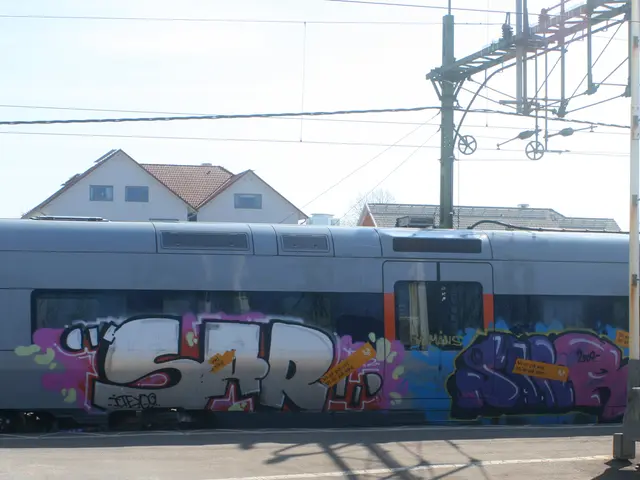Global Leader Sektkellerei Henkell Freixenet Navigates Turbulent Waters
U.S. tariffs posing threat to Henkell Freixenet's business prospects - U.S. tariffs potentially pose threat to Henkell Freixenet champagne producers
Hey there! Let's dive into the challenges faced by Sektkellerei Henkell Freixenet, a sparkling wine powerhouse that's Got the Bubbles flowing.
Dancing With Dilemmas
Stormy seas ahead for Henkell Freixenet
Andreas Brokemper, the man at the helm, is sweating the small stuff. Trade tensions, climate change calamities, and post-war aftershocks are playing havoc with their operations. "2025 promises a tempestuous market climate," Brokemper warned, "Global economic instability, geopolitical uncertainties, and gusty trade policies will shape our consumers' preferences."
Back to Black with a Bang
Based in Wiesbaden and Catalonia, this slick operation ranks numero uno in global sparkling wine sales. Last year, their revenue went up by 1.5%, hitting €1.248 billion, and including taxes, it rose by 1.0% to €1.493 billion. The profits, as always, are their top secret.
Tariffs threatened to be the Uninvited Guests
Ex-President Donald Trump's love-hate relationship with the EU has left Henkell Freixenet in a squeeze. Tariffs, currently at 10%, could - if Trump has his way - balloon to a whopping 200%. "That'd be like Prohibition all over again," Brokemper frets. Let's hope it doesn't come to that, eh?
The drought in the northeastern Penedès region of Spain, where Cava sparkling wine is produced, has had a harsh impact on their business. The 2023 harvest was a disaster, with 2024 only barely scraping by. 2025's forecast is still under wraps, but it's safe to say they're not exactly holding their breath.
But worry not, as Henkell Freixenet is taking to the high seas for greener pastures. In England's south, they bought Bolney Wine Estate in Brighton in 2022, where they're testing the local conditions.
No- and Low-Alcohol Drinks on the Upswing
Non-alcoholic drinks are steadily making their mark in the market, and Henkell Freixenet is riding that wave. The trendy YOLO generation is becoming increasingly health-conscious, and Henkell Freixenet is embracing that change. They've slapped light blue neck ribbons on their iconic bottles to mark the no-alcohol versions of their best-sellers.
Revenue from non-taxed beverages remained steady in Western Europe in 2024, but they saw more growth in Eastern Europe and North and South America. Germany, Austria, Switzerland, and Asia saw a slight dip, but what's a little hiccup compared to riding the zeitgeist, eh? The headcount dropped by 2.4% to 3,535 souls.
Keywords:
- Sekt
- Climate Change
- Wiesbaden
- Sparkling Wine
- Donald Trump
- Drinks
- Catalonia
- Wine
- Spirits
- Geschwister
oh, and let's not forget the "no-" and "low-alcohol" drinks trend!
Historical Context: FYI, the U.S. has been slapping tariffs on goods from the EU due to trade disputes. These tariffs made life tough for exporters like Henkell Freixenet. However, we couldn't find specifics on exactly how these tariffs affected Henkell Freixenet.
Diversification and Adaptation: The company is keeping calm and carrying on by expanding their offerings to the no- and low-alcohol market. This strategy gives them a safety net of sorts, as it appeals to a broader range of consumers and helps them weather storms of market risks. For instance, they launched a 0.0% sparkling wine in 2020 and expanded it to the U.S. market[1].
Concerns About Future Tariffs: If Trump (or any future leader) decides to lay down more tariffs, it'd be a headache for Henkell Freixenet. This would have an impact on their pricing strategy, profitability, and competitiveness. Their rollout of new products, such as Freixenet Cordon Negro 0.0%, could be influenced by future tariffs in other regions, and they might need to revise their market strategies accordingly. Lastly, tariffs could create supply chain headaches that'd disrupt their ability to deliver products globally.
- Despite the turbulent market conditions in EC countries, Sektkellerei Henkell Freixenet, based in Wiesbaden and Catalonia, remains resilient, adapting its employment policy to meet the changing landscape.
- In response to increasing concerns about climate change, especially in the Penedés region where Cava is produced, Henkell Freixenet is confronting environmental issues as part of its employment policy.
- In an attempt to navigate potential future trade tensions, Henkell Freixenet's employment policy is driving diversification, with a strategic expansion into the no- and low-alcohol drinks market.
- The rising popularity of health-conscious lifestyle choices among the younger demographic is being addressed by Henkell Freixenet's updated employment policy, emphasizing innovation in non-alcoholic and sparkling wine production.
- With an employment policy focused on financial sustainability, Henkell Freixenet is proactively adapting to the potential impacts of tariffs, such as those previously imposed by Donald Trump's administration, on their business operations.
- Aware of the potential economic instability and geopolitical uncertainties, Henkell Freixenet's employment policy is flexible, ready to integrate new market trends and adjust strategies accordingly to maintain a competitive edge in the global industry.
- As part of their proactive approach, Henkell Freixenet's employment policy is also focusing on environmental science and technology, prioritizing sustainable practices within the food-and-drink sector and supporting the transition toward a greener lifestyle.
- With a workforce of 3,535 employees and counting, Henkell Freixenet's employment policy values a diverse team that can bring innovation and creativity to the challenges presented by changing markets and industry trends.








